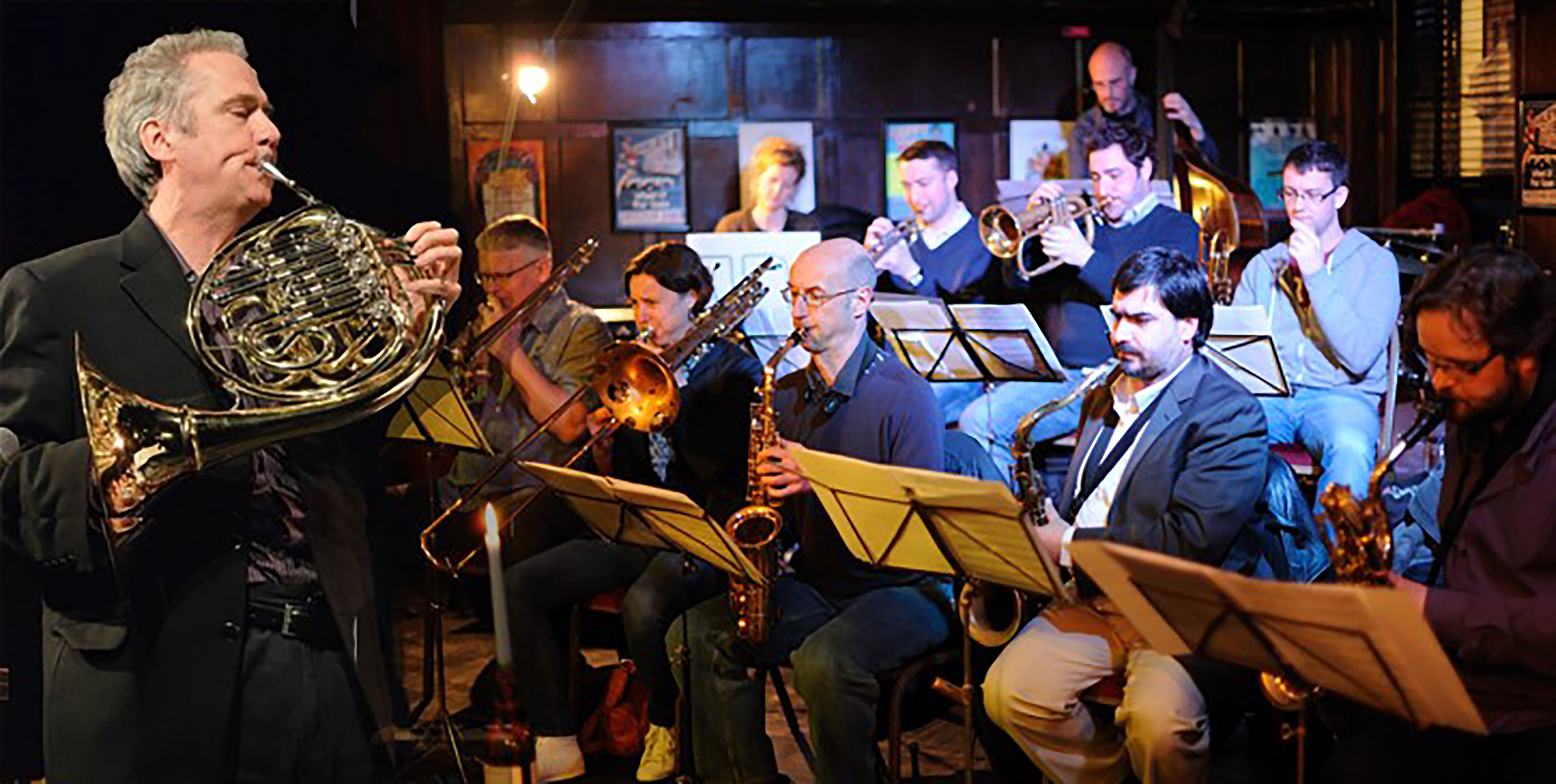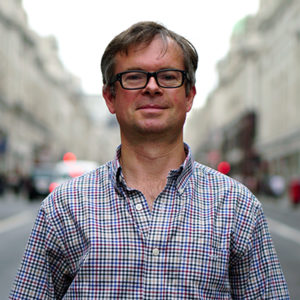Jim Rattigan Interview

Let’s start by talking a bit about your background. How did you get into music?
I’ve done music forever. I literally started life as an Irish dancer, can you believe. My parents were Irish. I can’t remember not doing it, I was so young. And then I got into the piano accordion, I did that until I was 16. I became British champion, actually. Then I started on the trumpet, then the cornet, then the French horn. I got hooked on the French horn. I went to college, and then started working with orchestras, all the London orchestras. The London Philharmonic mainly, I then joined the Royal Philharmonic Orchestra as a French horn player. But all this time I was playing a bit of jazz piano for my own enjoyment. I was an Oscar Peterson fan, on a massive scale. And also Bill Evans, Weather Report and I was really into jazz piano, mainly. So I did that for fun, whilst I was playing the orchestral scene. I did lots of film work as well, lots of touring. And in the end I decided to leave it all behind and pursue a career in jazz, writing music for my own groups, to be more creative. I took the plunge. In the meantime I still did sessions. I left the orchestra but still did recording sessions for pop groups, telly and film, to pay the bills. Jazz doesn’t pay the bills. And that’s where I am at the moment.
What drew you to the French horn?
I played the trumpet in the school band and there was this strange shaped instrument on the floor. I asked what it was because I didn’t even know. And somebody said ‘If you can get a note out of it, you can play it’. So I just opened the case and thought it looked amazing. So I got a note out of it. I just liked the look of it, and nobody else wanted to play it because it was too difficult, apparently. So I played it and I just got hooked. I don’t know why. I just got completely hooked on this sound. When I joined an orchestra you have to make an orchestral sound. So when I started playing jazz I wanted to bring that sound to the French horn. I wanted it to be unmistakable. I wanted to bring that into my jazz, into my composition. So when I play it, the French horn sound is an unmistakable sound. That’s what I’m aiming for, which is very different, quite new.
The band is called Pavillon. How did you choose the name?
Basically it’s the French word for the bell of the instrument. It could be the bell of a trumpet or a trombone, rather than just the French horn. I don’t know why I chose that name because nobody knows how to pronounce it. Often in classical music you get an instruction in the music saying ‘pavillons en l’air’ which means ‘bells in the air’. I don’t know if you’ve ever seen anything like that, you stick the bell in the air and it all looks very spectacular. So I thought I’d nick that. I was going to call it ‘pavillon d’un l’air’ but I thought that was too much, so I settled on just Pavillon but unfortunately very occasionally it’s pronounced right.
The band itself has quite an amazing lineup. How did you manage that?
I pay them lots of money! No, initially I knew them all. When I left the RPO and started to play jazz, I got a phone call from Hans Koller. His band was called The Magic Mountain. The French horn player left, as he didn’t want to do it. So Hans asked if I fancied it and I accepted. I started playing with Hans Koller, and although it was like jumping in at the deep end, I found it totally inspiring. I loved it, I absolutely loved it. The music was incredible and I felt that it was a completely new life. It was wonderful. Dave Whitford was the bass player. I was at Trinity with Martin Speake, before the days of jazz courses. In my travels I started working quite a lot with Mike Gibbs’ band. He was very into the French horn and I still work with him. I met people such as Robbie Robson and Percy Pursglove. So I got everyone that I worked with, that I knew, together. That’s how the band formed. And they enjoyed it, the music and what I was doing. I got a tour together a couple of years ago and that went down very well.
They turn up. They’re really up for it. If they weren’t up for it, they wouldn’t turn up. They’re amazing. I still pinch myself that these people turn up and really give it their all. I feel like the luckiest bloke in the world. They’re amazing musicians.
The new album, The Freedom of Movement, is out on 18th October. Were you inspired by anything in particular for the album?
The inspiration comes from playing with a lot of different people. Initially when I started playing with Hans Koller that was a massive inspiration. His music sounded so fresh to me. I’ve played with Mike Gibbs a lot and listened to Gil Evans a lot. They’ve got their own sound. What fascinates me about these composers is that they create their own sound. If you put Gil Evans on then you know it’s Gil Evans, there’s just no question about it. I’m inspired by these people who create their own sound world. A French horn-led 12-piece group, well there aren’t any other ones. Really the sound is something that I’m trying to create.
How do you go about composing?
I try and write every day, if I’m not working. I work less these days. I don’t think of specific things to write for. I work with manuscript, just pencil and paper. There’s no other way that I can write. So I sit at the piano and write, and write every day and see what happens. Then I’ll put the arrangement down on Sibelius [notation software]. I try and see it as work. If you sit around waiting for inspiration then you’re going to be sitting around for quite a long time in my opinion. But I do get ideas from what’s going on in the world now, in our country. Nowadays it’s just in your face the whole time. You can’t avoid things like that influencing you. There are a couple of tunes on the album, the title track is obvious: Freedom of Movement. I’ve travelled the world playing music and going over to Europe all the time, moving freely. I moved in and out of different genres of music as well. I’ve played several. I was even in a grunge band for a while. So there are lots of different sides to music. There’s the obvious thing about the freedom of movement that is being faced now by musicians. That’s going to be pretty challenging, to say the least, if it all goes ahead. You can’t help be influenced by that. Then there’s the whole climate change thing going on with young people.
There are many different aspects of where the music comes from, but really deep down, what it is, you just have to get up and write music every day. I’ve discarded lots and lots of music. There are many tunes I’ve written that I haven’t pursued, that I’m not crazy about. Write, write, write all the time. It’s a great way to spend part of your day. That, and the garden. You’ve got to get out. It’s very important to get out and do other things. If you don’t go out then you go a bit mad. It’s great taking a band on tour. That’s really good fun. I really enjoy that.
What can we expect at the gig in Hastings on Tuesday 5th November?
It’s very different live. It’s so energetic. We really get going. And it opens up. It really is great fun. On the recording I’ve tried to get the same feel to it but the live event is quite different to the album.
Tuesday 5th November, 2019
Interview conducted by Charlie Anderson.
The album The Freedom of Movement by Jim Rattigan’s Pavillon is out now on Three Worlds Records.



